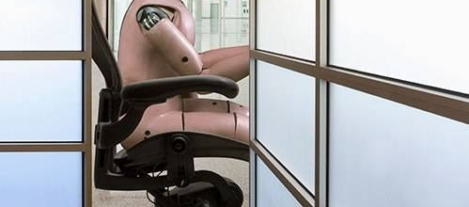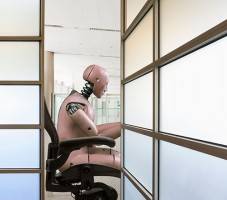December 1, 2015
Despite its drawbacks, LiFi has the potential to revolutionise office design 0
 During 2016, we can all expect to be hearing a lot more about a new technology called Li-Fi, which uses light to transmit high speed data. Li-Fi has already been trialled extensively in lab conditions and now for the first time it has been installed in an office in Tallinn, the capital of Estonia. It may even be substantially quicker than standard Wi-Fi. The people behind it claim it is already able to transmit data at a rate of 1 GB per second, which is around 100 times faster than Wi-Fi. Using light as a medium, however, does mean its main drawback is that it cannot penetrate walls. Designers and managers may also have concerns that the way it transmits data – basically by flickering the light from an individual LED like a massively sped up signal lamp (pictured) – but the developers claim this is completely imperceptible to the human eye and so has no consequences for individuals.
During 2016, we can all expect to be hearing a lot more about a new technology called Li-Fi, which uses light to transmit high speed data. Li-Fi has already been trialled extensively in lab conditions and now for the first time it has been installed in an office in Tallinn, the capital of Estonia. It may even be substantially quicker than standard Wi-Fi. The people behind it claim it is already able to transmit data at a rate of 1 GB per second, which is around 100 times faster than Wi-Fi. Using light as a medium, however, does mean its main drawback is that it cannot penetrate walls. Designers and managers may also have concerns that the way it transmits data – basically by flickering the light from an individual LED like a massively sped up signal lamp (pictured) – but the developers claim this is completely imperceptible to the human eye and so has no consequences for individuals.

































December 8, 2015
Linear equations are no longer enough to determine the size of offices
by Mark Eltringham • Comment, Facilities management, Furniture, Technology, Workplace design
In 2013, the US Census Bureau announced that the official human population of the Earth had exceeded 7 billion for the first time. This provoked people to raise concerns that were couched in Malthusian pessimism. Although people might have assumed we’d left behind this kind of flawed thinking, there is obviously something appealing about the idea that exponential population growth is unsustainable when resources increase only in arithmetical terms. We’ve got a problem but what we should have learned in the two centuries since Thomas Malthus first popularised the idea is that there are complex factors that can influence the resources we need to survive, not least in terms of greater efficiency in the way we produce them. A similar debate is also apparent in the way in which the commercial property market is able to offer the right sort of buildings for modern organisations.
(more…)